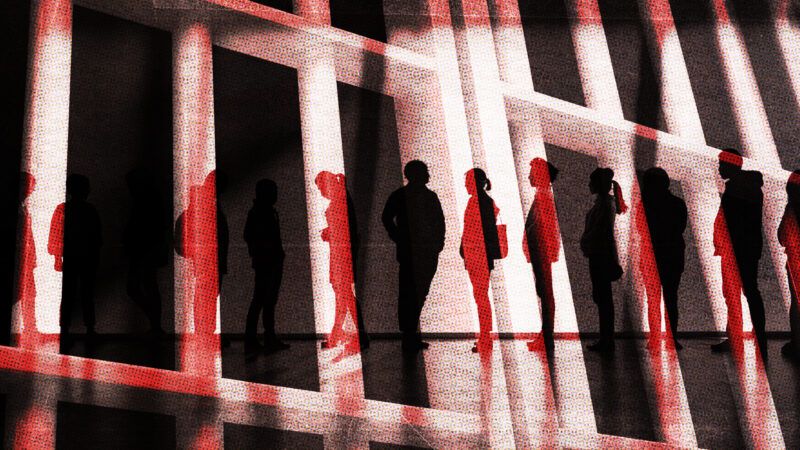The Laken Riley Act Reminds Us: If a Law Is Named After Someone, It's Probably Bad
Riley's murder was an atrocity. But the law bearing her name is a grab bag of authoritarian policies that have little to do with her death.

There's a popular mantra among skeptics of government power that goes like this: If a law is named after a person, it's probably bad.
Usually pegged to a victim whose story is genuinely tragic, and for whom compassion is warranted, such legislation often gives lawmakers license to enact authoritarian policies while using a bill's raw emotional packaging as both a shield from criticism and as ammunition to criticize those who don't get on board.
The Laken Riley Act, which moved closer to passing the Senate on Friday, is no exception. Drafted in response to the death of Laken Riley, a Georgia nursing student murdered last year by an unlawful immigrant named Jose Ibarra, the bill has become a grab bag of draconian policies that have little, if anything, to do with Riley's death, but will likely soon be enshrined into law in her name.
Prior to murdering Riley, Ibarra had been arrested for shoplifting. So the thrust of the bill begins there: It requires any undocumented immigrant to be held in federal detention without bail—they would not be granted a hearing by default—and be subject to deportation if they are arrested for a theft-related crime.
"ICE [Immigration and Customs Enforcement] will no longer have discretion to release individuals with those arrests, and will be required to hold them in detention without access to bond while they go through the removal process," says Aaron Reichlin-Melnick, a senior fellow at the American Immigration Council. "That aspect of the bill also applies even if the person was later acquitted or had charges dropped."
The latter part raises obvious due process concerns, and it applies to children, people protected by the Deferred Action for Childhood Arrivals (DACA) program, and those in the U.S. on temporary protected status. The former stipulation, meanwhile, potentially carries some rather dire unintended consequences: ICE has warned that the legislation may force the agency to release alleged offenders who pose significantly greater risk of danger, because detention centers can only hold but so many people. Lawmakers may be well-meaning as they seek to mandate that resources be funneled toward shoplifting suspects—as opposed to, say, people accused of more violent crimes—because one unlawful immigrant previously arrested for shoplifting ended up committing a terrible act. But that does not mean it is wise.
What's more, in what arguably has little connection to Laken Riley, the act bearing her name also permits state attorneys general to file lawsuits challenging any decision to grant someone immigration parole, and, perhaps more significantly, to sue secretaries of state in an attempt to block legal migration from "recalcitrant countries."
"The goal of this provision is to make it easier for states to challenge federal programs that grant visas or parole (temporary legal entry, employment, and residency in the US), such as the Biden Administration [Cuba, Haiti, Nicaragua, and Venezuela parole] program for people fleeing horrific violence and oppression in four Latin American nations (including three ruled by brutal socialist dictatorships)," writes Ilya Somin, a professor of law at George Mason University, at The Volokh Conspiracy. "Last year, a conservative federal judge ruled against a lawsuit brought against the program by a coalition of red states, on the ground that the latter lacked standing due to not having suffered the requisite 'harm' because of the program." The Laken Riley Act will make such standing much easier to find, and it will potentially allow attorneys general to sue to block visas from, say, India, a "recalcitrant country," as debates about high-skilled immigration continue to fracture much of the "new right."
"If all the bill did was mandate the deportation of migrants convicted of petty theft, it would make sense for many Democrats to back it, if only because there's so little political upside in defending the rights of undocumented shoplifters," writes Michelle Goldberg at The New York Times. But despite its wide-reaching implications, many Democrats have backed it—enough to likely get the GOP-led bill over the finish line—in what is almost certainly due, at least in part, to how the legislation came to be.
"You have to meet people where they are, even if your ideological priors might lead you in a different direction," Rep. Ritchie Torres (D–N.Y.), who voted in favor, told the Times. "I do worry that when we vote against bills like the Laken Riley Act, we run the risk of seeming out of touch with most Americans on the issue of immigration and border security."
What happened to Riley was an utter tragedy. But lawmakers should be more concerned about bad laws than bad optics.


Show Comments (138)